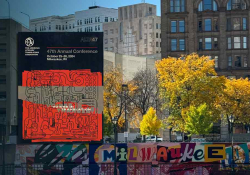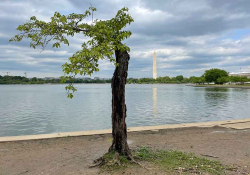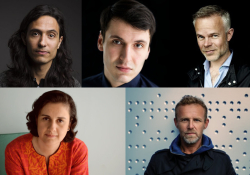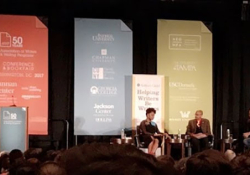Dispatch from Nicaragua
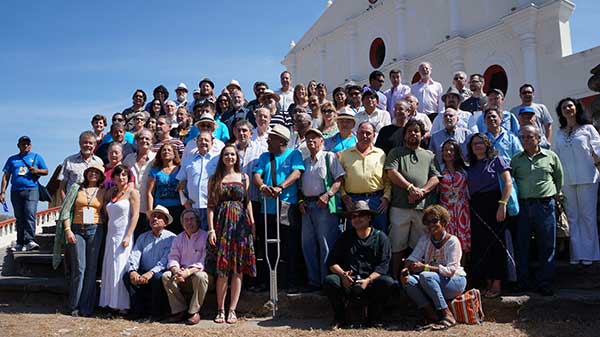
In her spellbinding The Country Under My Skin: A Memoir of Love and War (2002), Gioconda Belli provides a portrait of Granada that today’s visitor will readily recognize: “Located on the eastern shore of the great Lake Nicaragua—the second largest lake in Latin America—Granada had been the stage of wars and conflicts ever since it was founded in 1598. When Managua became the country’s capital, Granada retired like a lovely old lady to live out a restful old age. In the shadows of graceful mansions, its inhabitants cultivated a kind of phlegmatic skepticism that made them immune to political enthusiasms and passions. The favorite pastime of Granadans was to sway on their rocking chairs at their front doors in the afternoons, to see who was going by, chat and watch the sunset.”
Of course, as one might expect from the second poorest country in the Western hemisphere, this idyllic snapshot extends to about a square mile of the city’s historic center: the rest of Granada is a conglomeration of tin shacks and crumbling, crowded abodes. The peaceful, laid-back attitude of Granadans as described by Belli doesn’t betray the country’s present travails as it seems set to proceed with one of the most ambitious engineering projects the world has ever seen: the construction of the Interoceanic Grand Canal, which will link the Caribbean to the Pacific, completely surpassing Panama’s canal. Daniel Ortega’s de-Marxified Sandinistas, back in power since 2007, have long pushed for the $50 billion canal—in co-operation with China’s telecom billionaire Wang Jing—claiming that it will be worth all the displacement and long-term social and environmental damage.
Having long wanted to visit, I had gone to Granada with my fiancée for a short weekend break to escape the snow of the Catskills, and in the midst of booking our trip, I noticed that we would arrive toward the tail-end of the Festival Internacional de Poesía de Granada. On learning this, I wrote to David Shook—my go-to man for Latin American literature—asking if he had any tips for me, which of course he did. I knew that David had translated many of Nicaragua’s “Vanguardia” poets—members of a literary movement active in the late 1920s and early 1930s, including José Coronel Urtecho, Pablo Antonio Cuadra, Luis Downing Urtecho, Octavio Rocha and Joaquín Pasos—in his charming pamphlet Made in Granada: Visual Poems from Nicaragua’s ’30s Vanguardia. Here is Urtecho’s “Masterpiece”:

Yet by the time we’d arrived, the festival had already wrapped up, Plaza de la Independencia—where the main stage of the festival had been erected from February 15th to the 22nd, drawing upwards of five hundred listeners each evening—was by then deserted, and the eighty poets, from almost as many countries, had all packed their bags and gone home. Fortunately—although it didn’t seem so at the time—I met a number of people who told me (at length) what I’d missed out on: Ernesto Cardenal, the Liberation poet-priest of Nicaragua, reading his famous “Oración para Marilyn Monroe / Prayer for Marilyn Monroe”; the Cuban American Richard Blanco; Slovenia’s Gašper Malej; Italy’s Claudio Pozzani; Malta’s Immanuel Mifsud; and, of course, Gioconda Belli in the flesh, to name only a few.
Travelers hungry for something interesting to read will find anything they could possibly desire in Granada’s Lucha Libro, which boasts an especially fantastic section of Central and South American literature in translation.
On David’s recommendation, I paid a visit to Lucha Libro Books on Calle Cervantes, just a stone’s throw from Granada’s cathedral, and met the co-owner Troy Fuss. When Troy first showed up in town a few years ago, there were only a couple of bookshops, and they mostly sold “complete crap.” However, the situation has changed, and travelers hungry for something interesting to read will find anything they could possibly desire in Lucha Libro, which boasts an especially fantastic section of Central and South American literature in translation. Just before I left Troy’s bookshop with a bundle of books under my arm, my eye drifted toward a slim pink pamphlet entitled Espectros y Sombras / Ghosts and Shadows (Cold Hub Press, 2014). “Ah, he was here too!” Troy said, noticing my interest, meaning the New Zealand poet and publisher Roger Hickin, the book’s translator. The author was the Chilean poet Sergio Badilla Castillo, who’d spent a great deal of his life in exile after Pinochet’s coup in 1973.
I spent the remainder of my time wandering around Granada, slightly sour about having missed out on the festival, but comforted by a few of the city’s literary sights, the obelisk monument to Rubén Darío in the Parque Central, and the tower of La Merced church, where the Vanguardia poets used to meet and workshop their poems. A few hours before catching the ride back to the airport, I lingered for a moment on a bench in Plaza de la Independencia and tried to picture the stage as it might have looked. When my vision didn’t materialize, I opened Castillo’s and Hickin’s Ghosts and Shadows and stumbled onto the following poem:
Epiphany
Sergio Badilla Castillo
A courtyard filled with prophets
Insomniac virgins doze and start
in the endless wait
and my dead legs come back to life.
A bank alarm goes off and an unfazed youth
keeps talking on his mobile phone.
Interviewed for radio I state that I’m a believer,
pointlessly quoting St Augustine’s Confessions.
The prophets are impatient on the cloister steps.
Loudspeakers let loose a heavenly music
and a pack of dogs growls among the crowd.
My ears and extremities feel cold.
I look to the horizon and see a mass of cumulus
and a pale moon fade into the black cosmos
supposedly plotting an escape.
The prophets withdraw quietly to the temple.
False alarm: no epiphany today.
Hudson, New York

